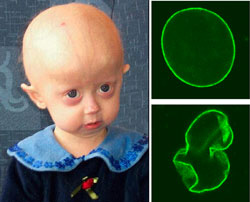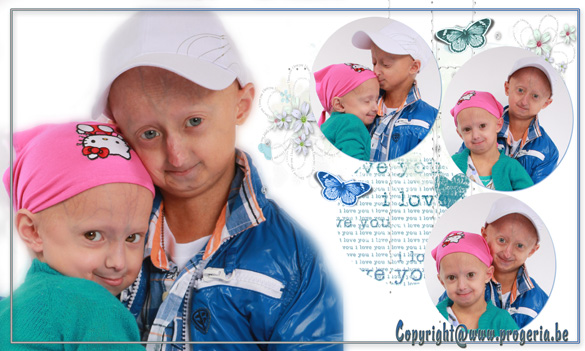HGPS (Hutchinson-Gilford Progeria Syndrome) or Progeria is an extremely rare, fatal genetic condition. The word Progeria comes from the Greek progerosmeaning 'prematurely old'. The Greek wordpro means 'before', while the word gerasmeans 'old age'.
Progeria affects children and gives them an appearance of accelerated aging. The classic type of Progeria (there are different forms) is Hutchinson-Gilford Progeria Syndrome (HGPS). Progeria was first described in an academic journal by Dr. Jonathan Hutchinson in 1886, and Dr. Hastings Gilford in 1897 - both in England.
How prevalent is Progeria?
According to Hayley's Page "At present there are 53 known cases of Progeria around the world and only 2 in the UK". There is a reported incidence of Progeria of approximately 1 in every 4 to 8 million newborns. Both boys and girls run an equal risk of having Progeria.
Progeria appears to affect children of all races equally. Over the last 15 years the following countries have had reported cases - Algeria, Argentina, Australia, Austria, Canada, China, Cuba, England, France, Germany, Israel, Italy, Mexico, the Netherlands, Poland, Puerto Rico, South Africa, South America, South Korea, Switzerland, Turkey, the US, Venezuela, Vietnam and Yugoslavia.
What are the characteristics of Progeria?

In Progeria patients, the cell nucleus has dramatically aberrant morphology (bottom, right) rather than the uniform shape typically found in healthy individuals (top, right).
The Cell Nucleus and Aging: Tantalizing Clues and Hopeful Promises. Scaffidi P, Gordon L, Misteli T. PLoS Biology Vol. 3/11/2005, e395
Children with Progeria are born looking healthy. When they are about 10 to 24 months old, features of accelerated aging start to appear. Signs of Progeria may include:
Growth failure
Loss of body fat
Loss of hair
Skin starts to look aged
Stiffness in the joints
Hip dislocation
Generalized atherosclerosis (cardio and heart disease)
Stroke
Although they may come from varying ethnic backgrounds, children with Progeria have a surprisingly similar appearance. Progeria patients generally die between the ages of 8 and 21 - with the average age being 13.
Children who suffer from Progeria are genetically susceptible to premature, progressive heart disease. Nearly all Progeria patients die from heart disease. Heart disease is also one of the leading causes of death globally. Children with Progeria commonly experience cardiovascular events, such as hypertension (high blood pressure), stroke, angina, enlarged heart and heart failure - conditions linked to aging.
Experts say that any research into finding a cure for Progeria would probably have results which would benefit adults with diseases linked to aging.

What causes Progeria?
90% of children with Progeria have a mutation on the gene that encodes Lamin A, a protein that holds the nucleus of the cell together. It is believed that the defective Lamin A protein makes the nucleus unstable. This instability seems to lead to the process of premature aging among Progeria patients.
Is Progeria hereditary?
Experts do not believe that Progera is hereditary. They say it is due to a rare gene change which happens purely by chance. A non-twin sibling runs the same risk of having Progera as any other child from another family. In about 1 in every 100 cases of HGPS the syndrome is passed down to the next generation within the same family.
Diagnosis of Progeria
The health care professional will possibly suspect Progeria if the signs and symptoms are there - aging skin, loss of hair, stiffness of joints, etc. This can then be confirmed through a genetic test. The Progeria Research Foundation has created a Diagnostic Testing Program.
Treatment hope
Farnesyltransferase inhibitors (FTIs), currently used for treating cancer, might reverse the nuclear structure abnormalities that are believed to cause Progeria. Studies carried out on mice with Progeria-like signs and symptoms showed that FTIs appeared to offer some improvements. Of the 13 mice treated with FTI, only one died during the 20-week UCLS study. Dr Leslie Gordon, director of the Progeria Research Foundation, said: "This study gives us pieces of information critical to our movement toward clinical trials in children with progeria."
Source : http://www.medicalnewstoday.com/articles/1467

nice write up! I suffered from dementia, I was like a Psycho, I sought help from DR Jose Alessio, with his drugs, prayers and instructions I was treated and now i am free!pray to God and follow the instructions of Dr Jose, he has the perfect solutions for the following ailments,SCHIZOPHRENIA,TRAUMATIC BRAIN INJURIES or TBI, DELUSIONS, BRAIN CANCER, APHASIA, AUTISM, PSYCHOSIS, PARKINSON'S DISEASE AND STROKES.He is such a genius dealing with brain and mind issues, you can write to him on joseherbals28@gmail.com He will surely be able to help you
ReplyDeleteI am Matthias lang, from Orlando u s a, i suffered from schizophrenia
ReplyDeletefor 28 years, i lived in pain with the knowledge that i wasn't going to ever be like every normal human, i contacted so many doctors on this issue,and i have use so many western drugs prescribe by various doctors and all was no avail, because i was determined to get my life back, one day i was researching for this on internet and i saw a post about devansh herbal health care who cure different manners of diseases,including schizophrenia, I contacted him via email: devanshherbalheathcare@gmail.com and made purchase of the schizophrenia herb, i received the herb through USPS within 24 hours, when i received the herb i applied it as prescribed, and to god be the glory i was totally cured of schizophrenia within 1 months of usages,my dear brothers and sisters You do not have to suffer more just contact him for his medicine on devanshherbalheathcare@gmail.com.com he will definitely put an end to that problem of yours